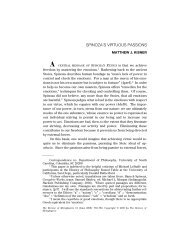heidegger's being and time and national socialism - Philosophy ...
heidegger's being and time and national socialism - Philosophy ...
heidegger's being and time and national socialism - Philosophy ...
You also want an ePaper? Increase the reach of your titles
YUMPU automatically turns print PDFs into web optimized ePapers that Google loves.
PHILOSOPHY TODAY<br />
264<br />
possibility at stake “must be taken over by Dasein<br />
alone . . . [Dasein] is thus forced by that very anticipation<br />
into the possibility of taking over from<br />
itself its ownmost Being, <strong>and</strong> doing so of its own<br />
accord.” 87 Since Dasein itself must by itself take<br />
over its ownmost <strong>being</strong>, taking care of things <strong>and</strong><br />
solicitude fail in this situation. However, as he<br />
without delay continues, this does not mean that<br />
taking care of things <strong>and</strong> solicitude are irrelevant<br />
to authentic <strong>being</strong>. To the contrary, they belong to<br />
the condition of the possibility of existence in<br />
general. 88 As is obvious, Heidegger appropriates<br />
here Kant’s notion of the will <strong>and</strong> autonomy. As,<br />
in Kant, one must, at the end, not listen to anything<br />
other than one’s conscience within oneself,<br />
Heidegger stipulates that, when it comes to<br />
achieving authenticity, nothing exterior to oneself,<br />
nothing outside of oneself can be of<br />
help. The site of one’s ownmost <strong>being</strong> is within<br />
oneself, the impulse to take it over can come only<br />
from this site <strong>and</strong> not from outside, <strong>and</strong> it is only<br />
the individual Dasein itself that can make the effort,<br />
which, again, does not exclude that one’s<br />
ownmost <strong>being</strong> contains relations to other<br />
Dasein, authentic relations. As will become clear<br />
in the next step, Heidegger’s discussion of conscience,<br />
it must be an autonomous act of Dasein<br />
itself to give up its autonomy. Finally, as to the issue<br />
of double forgetting, Heidegger distinguishes<br />
from the authentic underst<strong>and</strong>ing of<br />
death laid out in §53 the ordinary one, <strong>and</strong> claims<br />
that the latter is derivative <strong>and</strong> covers up the former.<br />
89<br />
In the second chapter of Division Two,<br />
Heidegger discusses the call of conscience <strong>and</strong><br />
the answers of authentic <strong>and</strong> inauthentic Dasein.<br />
Authentic Dasein wants to have conscience, <strong>and</strong><br />
obeys the call of conscience while inauthentic<br />
Dasein tries to evade the call. 90 Inauthentic<br />
Dasein treats guilt as something from which one<br />
can cleanse oneself by paying back the equivalent.<br />
By contrast, authentic Dasein knows that it<br />
has to accept its nullity <strong>and</strong> essential <strong>being</strong> guilty<br />
without <strong>being</strong> able or entitled to remove it. 91 As in<br />
the case of all the existentials in Division One <strong>and</strong><br />
the <strong>being</strong> toward death in Division Two, also<br />
inauthentic underst<strong>and</strong>ing of conscience performs<br />
a double forgetting. It presupposes essential<br />
<strong>being</strong> guilty but perverts it, 92 <strong>and</strong> performs “a<br />
covering up the phenomenon in two ways.” 93<br />
Heidegger refers to Kant’s notion of conscience<br />
as a court procedure as the inauthentic underst<strong>and</strong>ing<br />
of the call, 94 <strong>and</strong> uses for this inauthentic<br />
underst<strong>and</strong>ing formulas, such as “‘trial,’”<br />
“talk[ing] about,” “a voice which is ‘universally’<br />
binding,” “world-conscience,” “reckoning up<br />
claims <strong>and</strong> balancing them off [ausgleichenden<br />
Verrechnens von Ansprüchen],” “that concern in<br />
which we reckon things up [besorgendes Ausgleichen],”<br />
“‘Life’ is a ‘business’, whether or not<br />
it covers its costs,” “concernfully reckoning up<br />
‘guilt’ <strong>and</strong> ‘innocence’ <strong>and</strong> balancing them off<br />
[besorgenden Verrechnens und Ausgleichens],”<br />
“as if Dasein were a ‘household’whose indebtedness<br />
simply need to be balanced off [ausgeglichen]<br />
in an orderly manner so that the Self<br />
may st<strong>and</strong> ‘by’ as a disinterested spectator,” <strong>and</strong><br />
the “idea of a business procedure that can be regulated.”<br />
95 Heidegger is talking here about the normative<br />
foundations of modernity, <strong>and</strong>, again, he<br />
is saying nothing new. In terms of the old distinction<br />
between proportional justice <strong>and</strong> arithmetical<br />
justice, 96 modernity rests on arithmetical justice<br />
<strong>and</strong> the implied equality of the different<br />
actors, in all areas of life <strong>and</strong>—“‘universally’<br />
binding” <strong>and</strong> “world-conscience”—worldwide.<br />
In the economy, one receives in return the equivalent<br />
to one’s service or money, <strong>and</strong> has no further<br />
claims on the other thereafter. In politics, everyone<br />
has equal rights <strong>and</strong> voting power, <strong>and</strong> in the<br />
parliaments the different groups reach, through<br />
talking, an agreement or a compromise, Ausgleich,<br />
“with which everyone can live.” As to justice,<br />
everyone has the right to a hearing in court,<br />
where both parties have to argue their cause <strong>and</strong><br />
where an impartial judge decides the case, <strong>and</strong><br />
everyone has the right after serving their sentence<br />
to be re-accepted as someone who is again<br />
free of guilt <strong>and</strong> can start all over again. Liberals<br />
<strong>and</strong> leftists approved, defended, <strong>and</strong> fought for<br />
the application of equality <strong>and</strong> arithmetical justice<br />
in all areas while rightists resisted it. Again,<br />
Scheler is a case in point. Before his turn, he saw,<br />
as many rightists, in democracy a sign that the<br />
mentality of society—in his words, “English<br />
cant”: treat everything as an opportunity for mak-
















